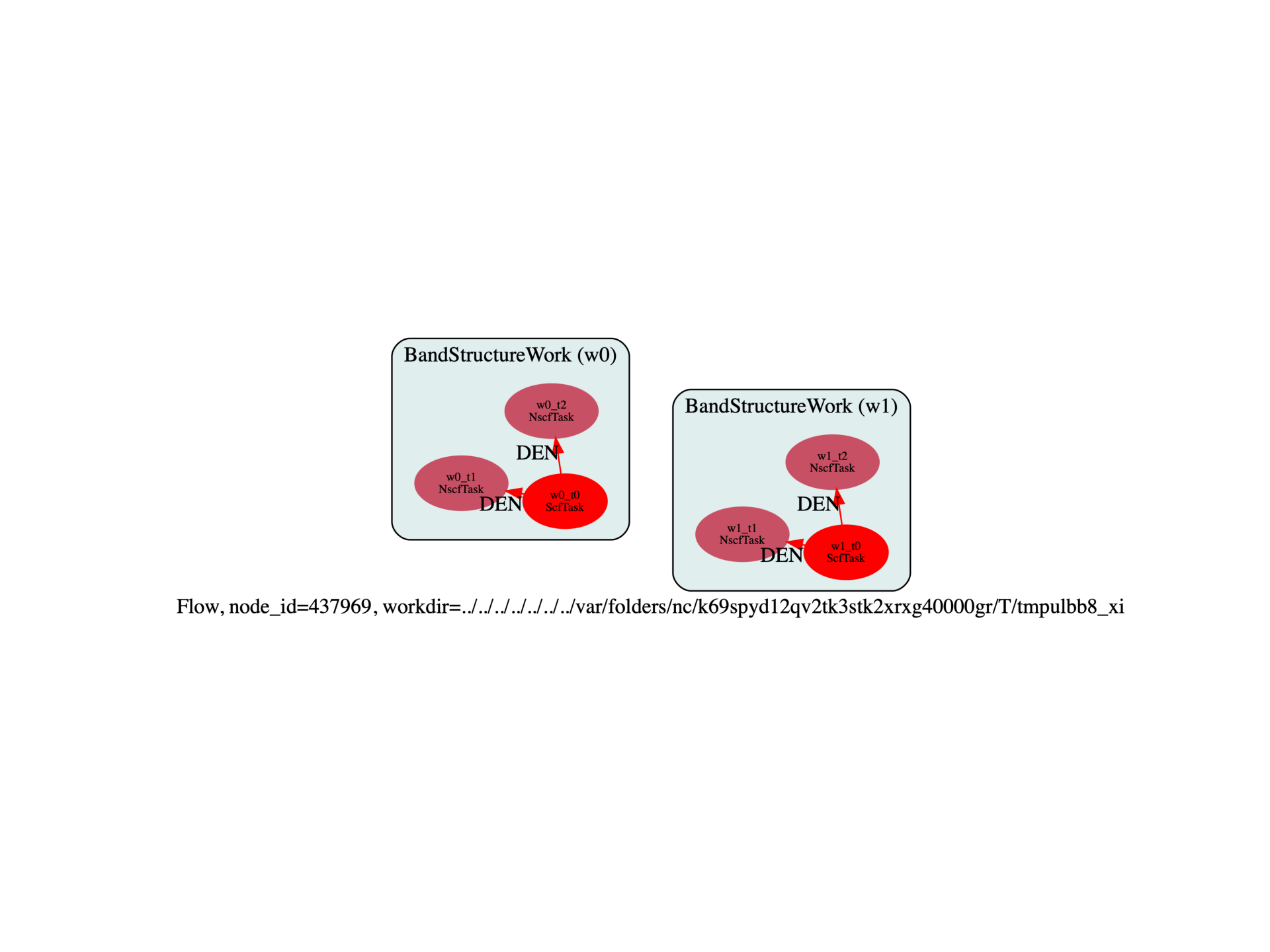Note
Go to the end to download the full example code.
KS + U calculations
This example shows how to compute the KS + U band structure of NiO with PAW for several values of U and J.
import sys
import os
import abipy.data as abidata
import abipy.abilab as abilab
import abipy.flowtk as flowtk
from abipy.flowtk.abiobjects import LdauParams
def make_scf_nscf_dos_inputs(structure, pseudos, luj_params, paral_kgb=1):
# Input file taken from tldau_2.in
multi = abilab.MultiDataset(structure, pseudos=pseudos, ndtset=3)
# Global variables
global_vars = dict(
#
ecut=12,
pawecutdg=30,
nband=40,
occopt=7,
tsmear=0.015,
nstep=50,
paral_kgb=paral_kgb,
#
# Spin
nsppol=1,
nspden=2,
nspinor=1,
spinat=[0, 0, 1,
0, 0, -1,
0, 0, 0,
0, 0, 0],
# Kpoint Grid
# The k point grid is not symmetric, but the calculations being
# for the ground-state, this is not a problem.
)
multi.set_vars(global_vars)
multi.set_vars(luj_params.to_abivars())
# GS run.
multi[0].set_vars(
iscf=17,
toldfe=1.0e-8,
ngkpt=[2, 2, 2],
chksymbreak=0,
)
# Band structure run.
multi[1].set_kpath(ndivsm=6)
multi[1].set_vars(tolwfr=1e-10)
# DOS calculation.
multi[2].set_vars(
iscf=-3, # NSCF calculation
ngkpt=structure.calc_ngkpt(nksmall=8),
shiftk=[0.0, 0.0, 0.0],
nshiftk=1,
tolwfr=1.e-8,
#pawprtdos=1,
)
# Generate two input files for the GS and the NSCF run
scf_input, nscf_input, dos_input = multi.split_datasets()
return scf_input, nscf_input, dos_input
def build_flow(options):
# Working directory (default is the name of the script with '.py' removed and "run_" replaced by "flow_")
if not options.workdir:
options.workdir = os.path.basename(sys.argv[0]).replace(".py", "").replace("run_", "flow_")
flow = flowtk.Flow(options.workdir, manager=options.manager)
# Create the work for the band structure calculation.
structure = abidata.structure_from_ucell("NiO")
pseudos = abidata.pseudos("28ni.paw", "8o.2.paw")
# The code below set up the parameters for the LDA+U calculation in NiO.
#usepawu 1
#lpawu 2 -1
#upawu 8.0 0.0 eV
#jpawu 0.8 0.0 eV
usepawu = 1
u_values = [5.0, 8.0]
for u in u_values:
# Apply U-J on Ni only.
luj_params = LdauParams(usepawu, structure)
luj_params.luj_for_symbol("Ni", l=2, u=u, j=0.1*u, unit="eV")
scf_input, nscf_input, dos_input = make_scf_nscf_dos_inputs(structure, pseudos, luj_params)
work = flowtk.BandStructureWork(scf_input, nscf_input, dos_inputs=dos_input)
flow.register_work(work)
return flow
# This block generates the thumbnails in the AbiPy gallery.
# You can safely REMOVE this part if you are using this script for production runs.
if os.getenv("READTHEDOCS", False):
__name__ = None
import tempfile
options = flowtk.build_flow_main_parser().parse_args(["-w", tempfile.mkdtemp()])
build_flow(options).graphviz_imshow()
@flowtk.flow_main
def main(options):
"""
This is our main function that will be invoked by the script.
flow_main is a decorator implementing the command line interface.
Command line args are stored in `options`.
"""
return build_flow(options)
if __name__ == "__main__":
sys.exit(main())

Run the script with:
run_ldaus.py -s
then use:
abirun.py flow_ldaus/ ebands
to analyze all GSR files produced by flow.
KS electronic bands:
nsppol nspinor nspden nkpt nband nelect fermie formula natom \
w0_t0 1 1 2 3 40 48.0 6.084 Ni2 O2 4
w0_t1 1 1 2 129 40 48.0 6.084 Ni2 O2 4
w0_t2 1 1 2 213 40 48.0 6.169 Ni2 O2 4
w1_t0 1 1 2 3 40 48.0 6.855 Ni2 O2 4
w1_t1 1 1 2 129 40 48.0 6.855 Ni2 O2 4
w1_t2 1 1 2 213 40 48.0 6.432 Ni2 O2 4
angle0 angle1 angle2 a b c volume abispg_num \
w0_t0 60.0 60.0 60.0 2.964 2.964 5.927 36.809 166
w0_t1 60.0 60.0 60.0 2.964 2.964 5.927 36.809 166
w0_t2 60.0 60.0 60.0 2.964 2.964 5.927 36.809 166
w1_t0 60.0 60.0 60.0 2.964 2.964 5.927 36.809 166
w1_t1 60.0 60.0 60.0 2.964 2.964 5.927 36.809 166
w1_t2 60.0 60.0 60.0 2.964 2.964 5.927 36.809 166
scheme occopt tsmear_ev bandwidth_spin0 fundgap_spin0 \
w0_t0 gaussian 7 0.408 99.343 3.324
w0_t1 gaussian 7 0.408 99.680 3.049
w0_t2 gaussian 7 0.408 99.838 2.560
w1_t0 gaussian 7 0.408 99.318 4.626
w1_t1 gaussian 7 0.408 99.628 3.352
w1_t2 gaussian 7 0.408 99.826 3.155
dirgap_spin0 task_class ncfile node_id \
w0_t0 3.351 ScfTask flow_ldaus/w0/t0/outdata/out_GSR.nc 241313
w0_t1 3.352 NscfTask flow_ldaus/w0/t1/outdata/out_GSR.nc 241314
w0_t2 3.041 NscfTask flow_ldaus/w0/t2/outdata/out_GSR.nc 241315
w1_t0 4.626 ScfTask flow_ldaus/w1/t0/outdata/out_GSR.nc 241317
w1_t1 3.928 NscfTask flow_ldaus/w1/t1/outdata/out_GSR.nc 241318
w1_t2 3.983 NscfTask flow_ldaus/w1/t2/outdata/out_GSR.nc 241319
status
w0_t0 Completed
w0_t1 Completed
w0_t2 Completed
w1_t0 Completed
w1_t1 Completed
w1_t2 Completed
The second task in each work (w*_t1) is a NSCF run along the high symmetry path. and we can compare the results of these two task by specifying the node identifiers:
abirun.py flow_ldaus/ ebands -p –nids=241314,241318

Total running time of the script: (0 minutes 0.632 seconds)